Previously on Drokk!: Character co-creator John Wagner has returned to the Judge Dredd fold on a regular basis, and if the result isn’t exactly the highpoint of the strip from the 1980s, it’s still far better than we’ve seen under replacement writers like Garth Ennis and Mark Millar. (Both of whom were very early in their careers at the time.) Is there life to Dredd beyond Wagner?
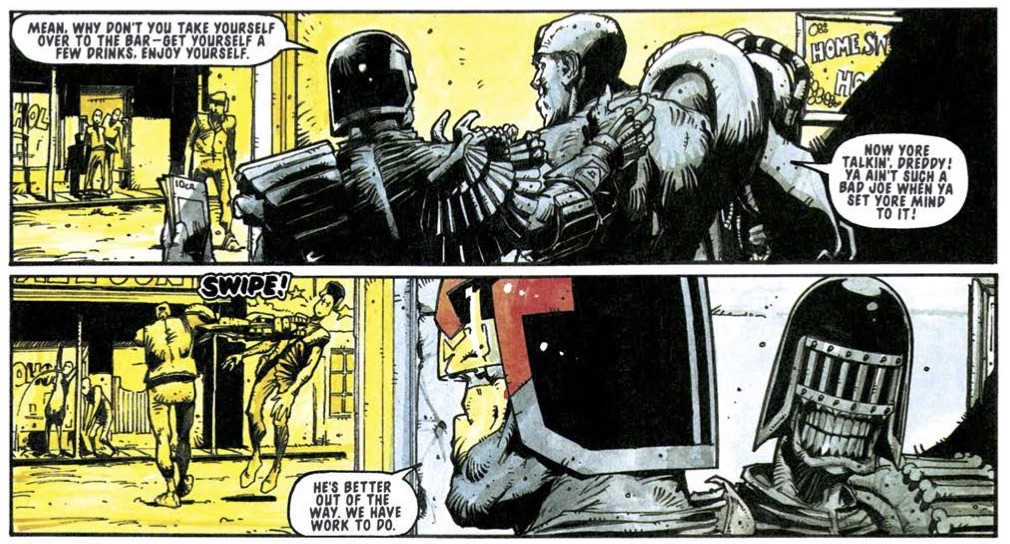
0:00:00-0:05:48: We’re covering Judge Dredd: The Complete Case Files Vol. 23 this episode, and both Jeff and myself are a little surprised at how much we enjoyed the book — especially given that we’re both willing to admit that this is far from the best the character has been. Given the high number of writers on this volume, could it be that people other than Wagner are finally figuring out how to do Dredd right?
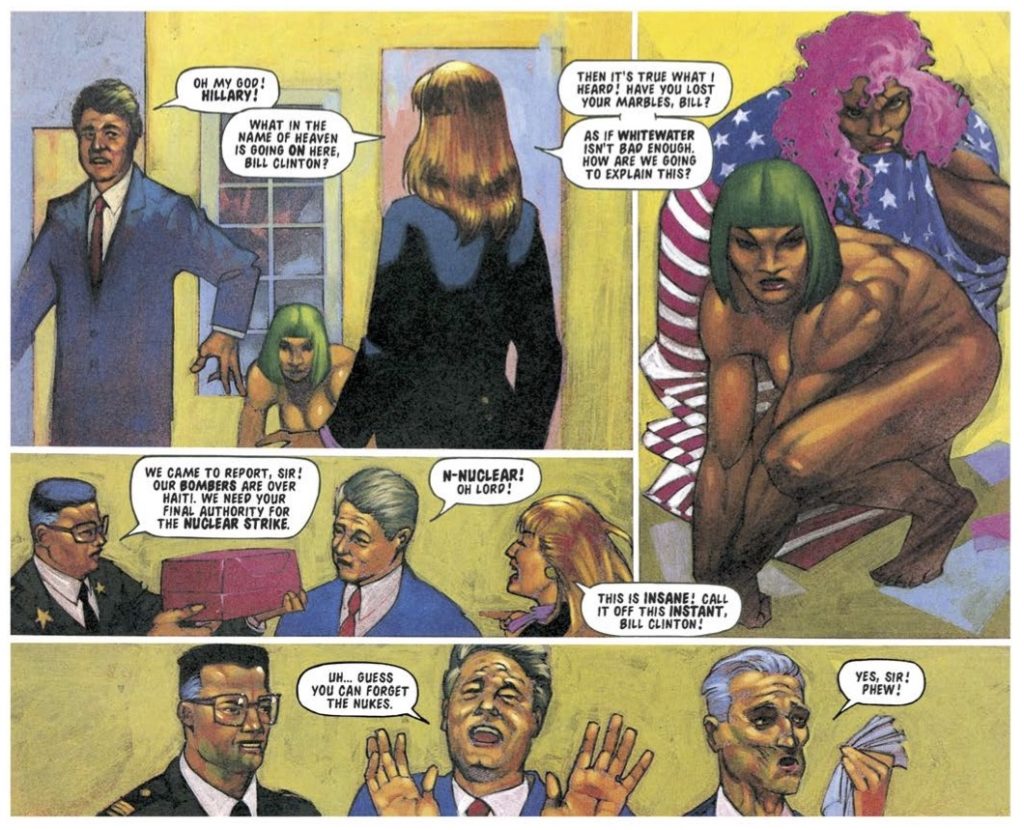
0:05:49-0:19:51: The first question I have for Jeff this episode is maybe the most obvious question of the book: exactly what was John Wagner’s deal with Bill Clinton? This collection has two separate stories parodying Clinton, both of which appeared at a time when I believed the President was more or less popular on both sides of the Atlantic. The educated Mr. Lester puts me right with a history lesson, and also attempts to answer my question by suggesting just what Wagner might have been writing about with regards to the Celebrity Saxophonist President’s appearances — both literal and parodic — in here.
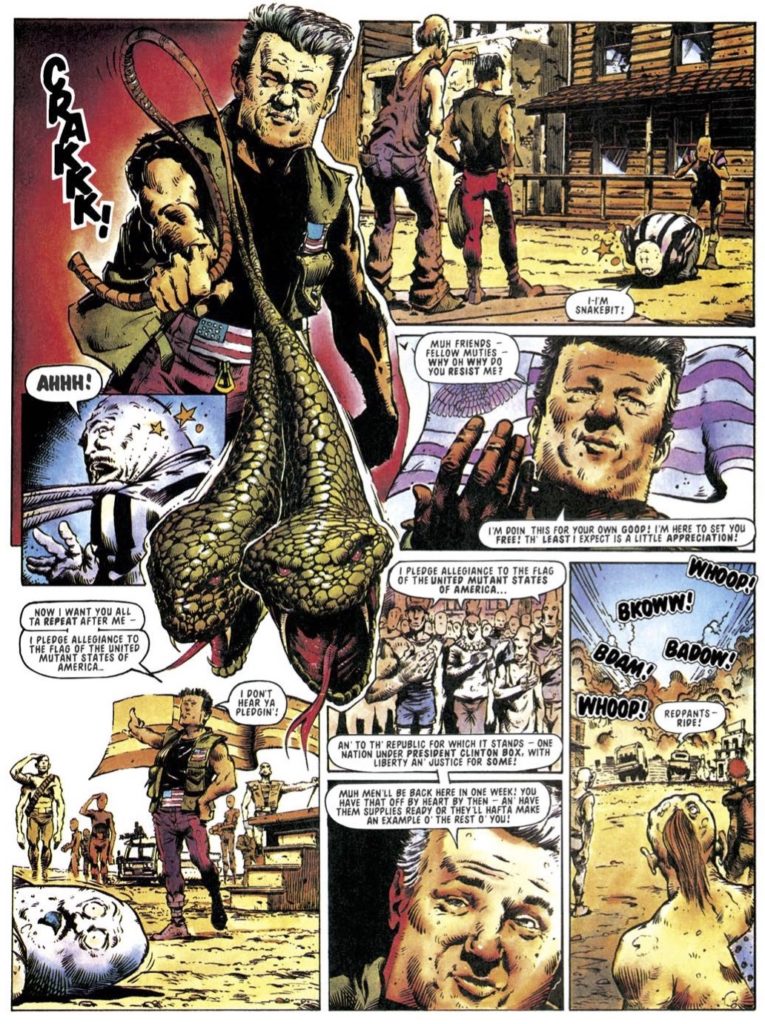
0:19:52-0:27:36: The second of the Clinton-centric stories is “The Three Amigos,” and Jeff and I talk about its appeal beyond any Presidential parody: that it’s a particularly Wagnerian tale that originally feels just the opposite, that it’s a classic Dredd mix of the ridiculous, the smart, and the gloriously stupid, and that it offers fan service in such a way that ultimately feels true to the spirit of Dredd (and John Wagner) and feels like great examples of both. We like the story, to say the least.

0:27:37-0:51:30: This leads into a discussion of whether or not the collection feels like it’s full of “classic Dredd” stories or not, and what that idea even means. How has John Wagner evolved as a writer, and does that evolution mean that he couldn’t write the same kind of stories as he did back in the 1990s? What is different in terms of what Wagner is trying to do in his stories in this volume? Can other writers measure up, or even find ways to continue what Jeff calls Wagner’s “melancholic” stories about Mega-City One using Dredd? Oh, and because we’re talking “classic” Dredd, everyone will be happy to know that we also talk about the racist “Language Barrier” short as well. No, not happy, what’s the word I’m looking for? Exhausted. That’s right. Also under the briefest of discussions: Is “bad” John Wagner just like Alan Grant?
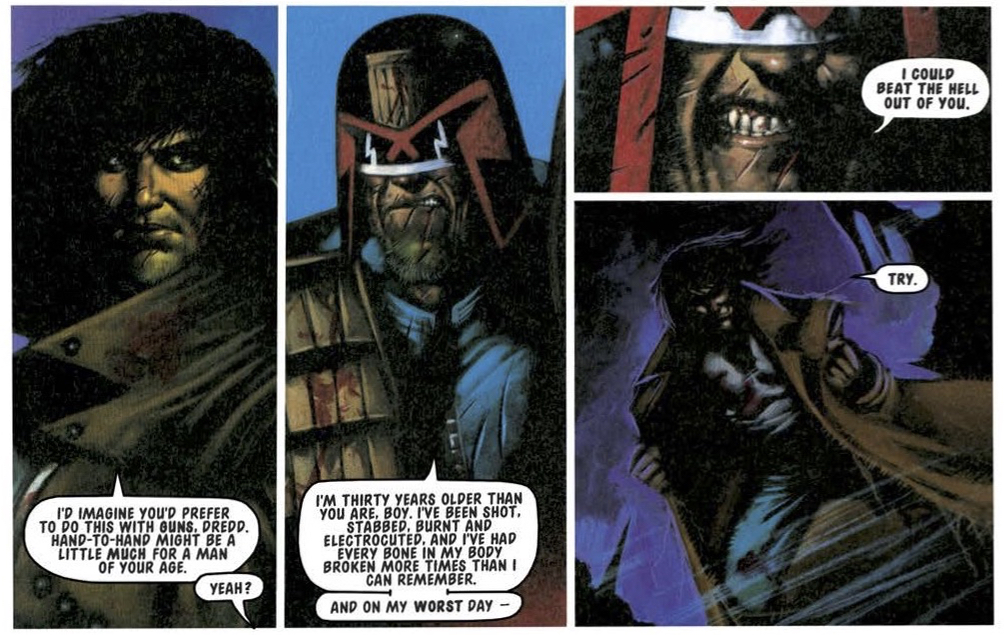
0:51:31-0:59:18: It’s not all John Wagner and the new generation of Dredd writers this time out, though; Garth Ennis returns unexpectedly with an overlong return to his self-consciously badass creation Jonni Kiss. To no-one’s surprise, Jeff dug it and I didn’t, and we talk a little bit about why, as well as how Ennis seemed to be about to escape from John Wagner’s shadow by embracing the spaghetti western, and how Wagner managed to ruin it.
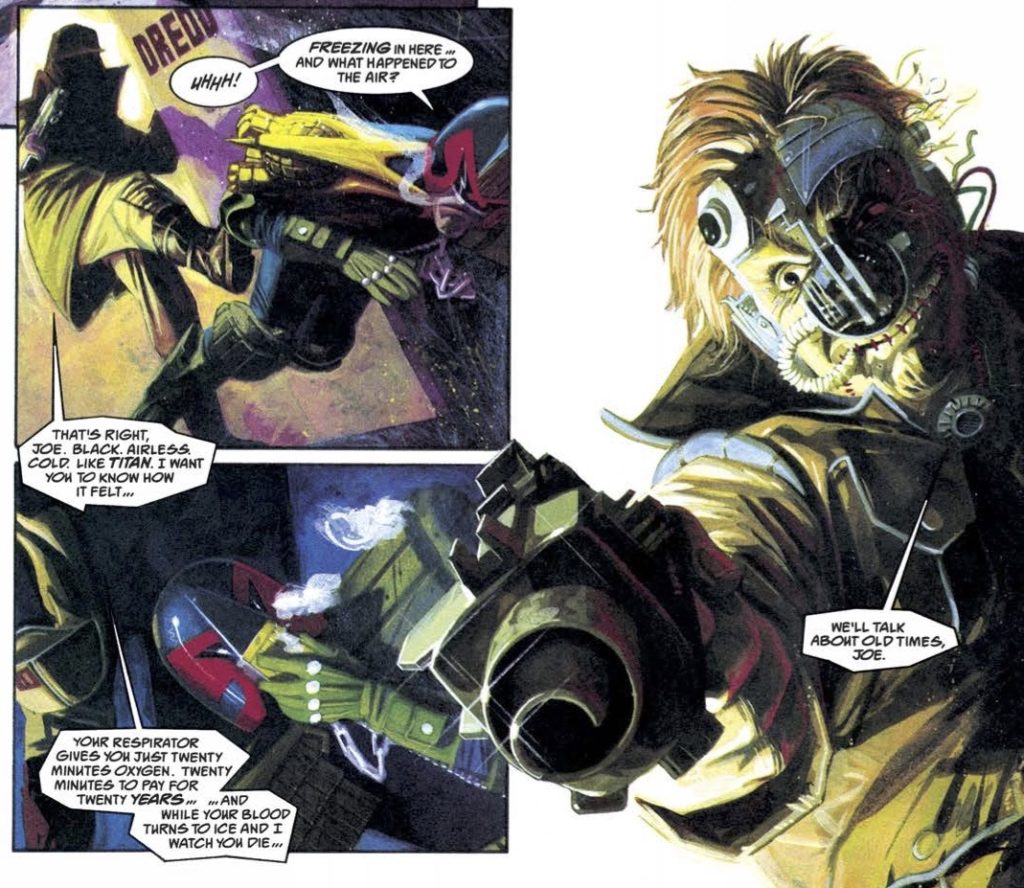
0:59:19-1:11:13: As if Ennis’s return wasn’t enough, this volume also sees the first Pat Mills Dredd work in a decade or so, and he’s basically rewriting one of his earliest contributions to the series. Does it work? Not really, and we talk about why, with Jeff bringing up the unexpected tropes that Mills seems eager to insert into the relationship between Dredd and his brother. Meanwhile, I really like Paul Johnston’s artwork, and Jeff doesn’t, and we talk for a little bit about why that is.
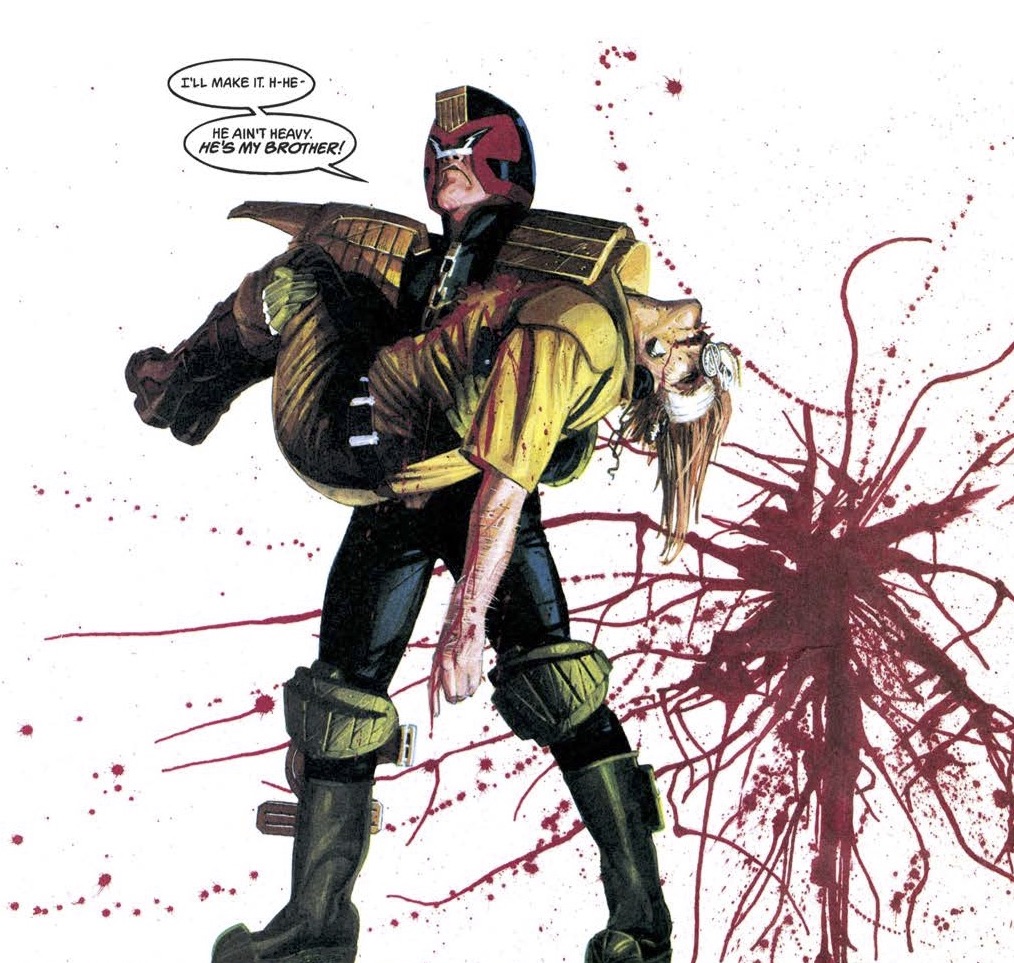
1:11:14-1:19:17: What is it about Dredd that Ennis and Mills don’t seem to grasp, but which John Wagner seems to have an instinctive feel for? Could it be that the latter really doesn’t seem to be concerned with showing Dredd to be particularly tough or even aware of anything beyond doing his job, whereas other writers — including Grant Morrison, in earlier stories — seem obsessed with giving the character a hero moment to remind readers that he is, in fact, the most macho character in comics?
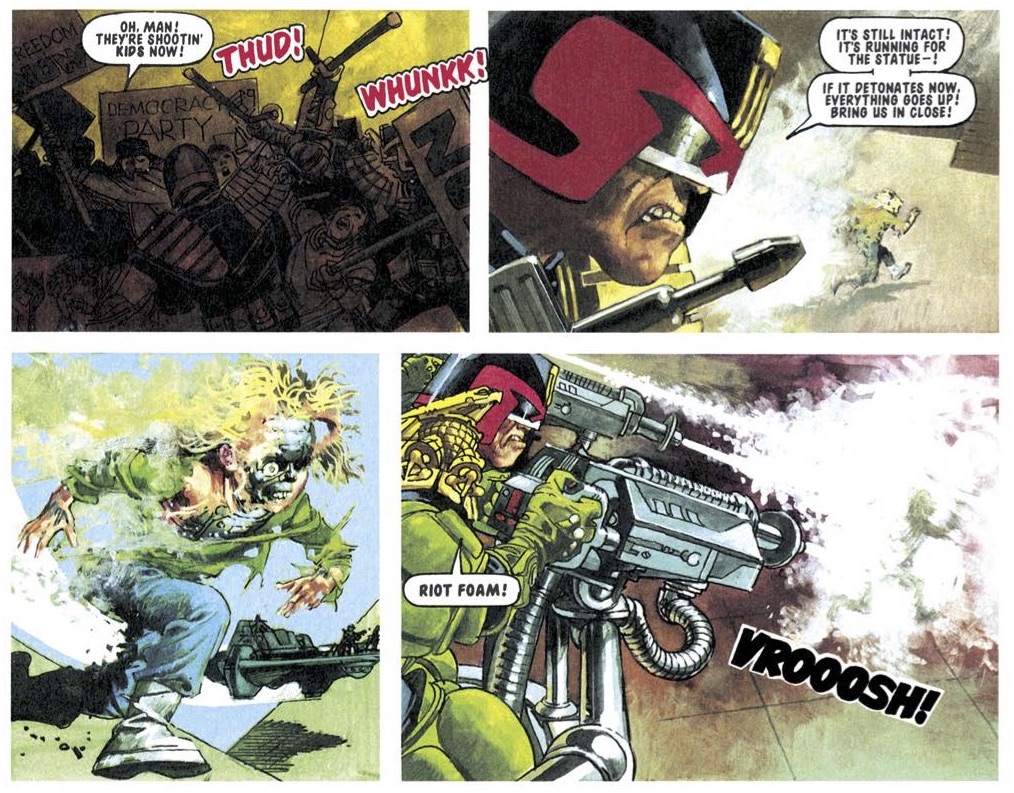
1:19:18-1:29:28: Is Judge Dredd a nihilistic strip? I argue that it’s not, but my esteemed colleague is far from convinced and has some examples to push his depressing agenda. I think that there’s a kindness and humanity in the strip — especially under Wagner, but not exclusively — that would belie it being truly nihilistic, and Jeff concedes that, if nothing else, Wagner refuses to be nihilistic towards recurring characters, and has an interesting theory as to why that might be.
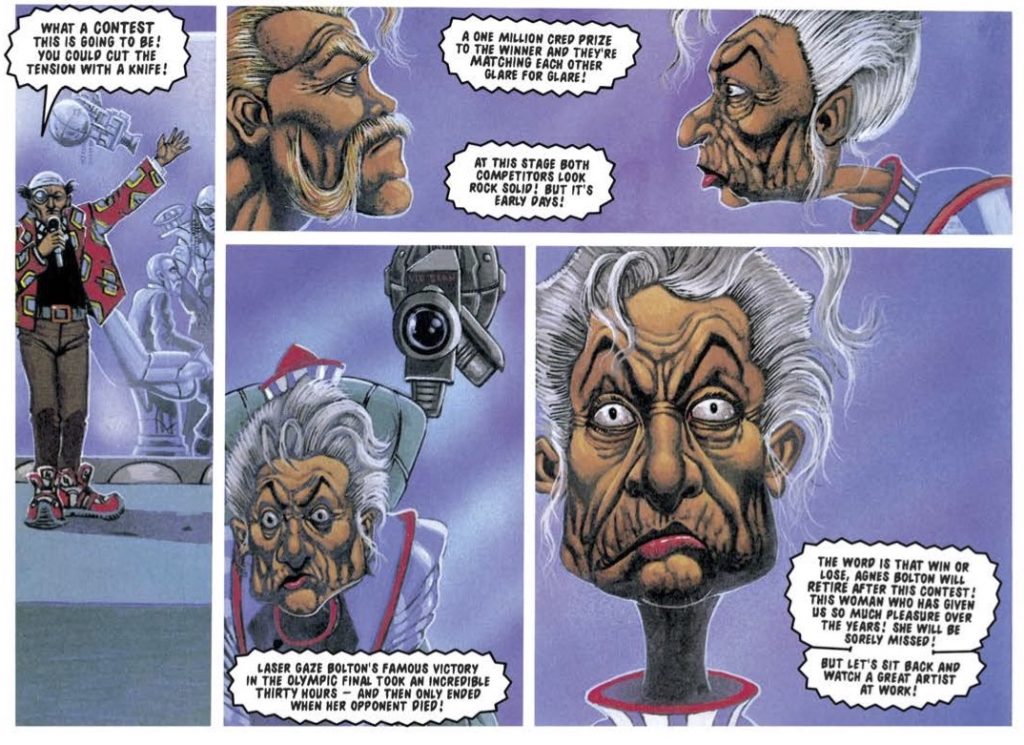
1:29:29-1:40:14: And so, is this volume Drokk or Dross? As might be clear by this point, we both think it’s Drokk, and we talk about our favorite stories — for me, “The Three Amigos,” for Jeff, the one-off “Bug Crazy,” but Jeff also talks a little bit more about the Ennis strip because he wants to torture me.
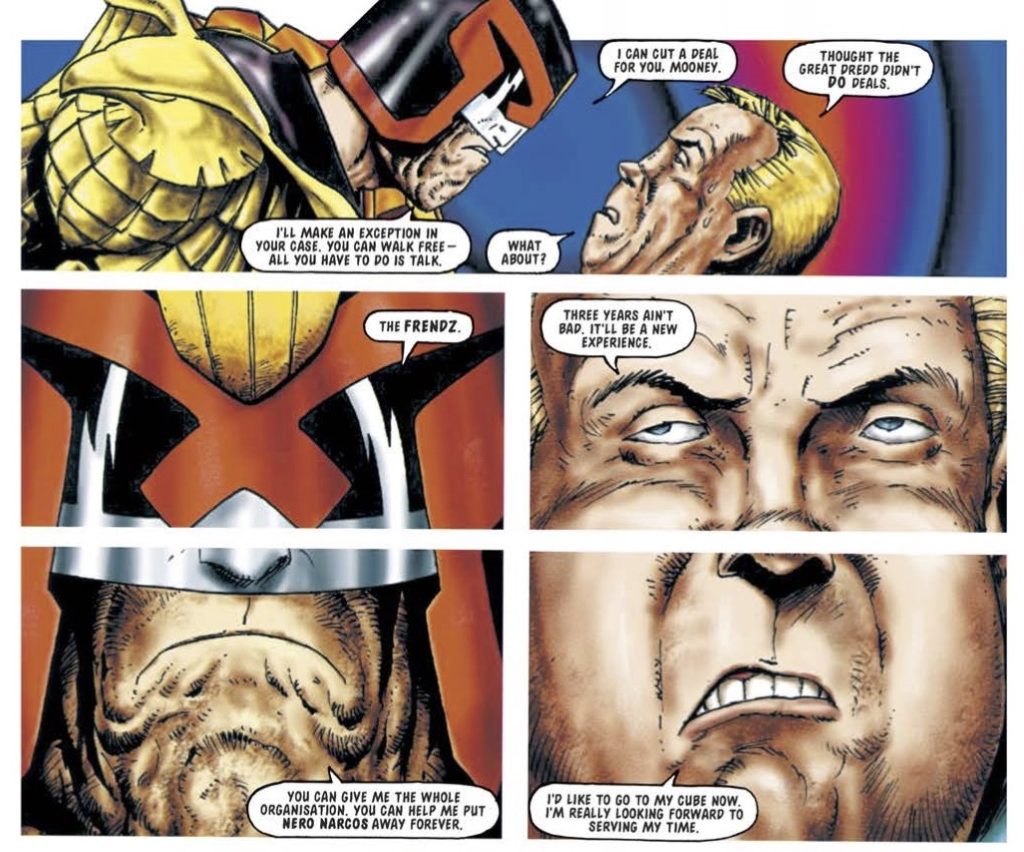
1:40:15-:1:46:41: Somehow, we’d gotten this far into the episode before we even mentioned “Bad Frendz,” a Wagner/Carlos Ezquerra collaboration that does everything you want a good Dredd to do, and also sets up things for the future — but that’s perhaps a sign that this collection was far better than it had any rights to be.
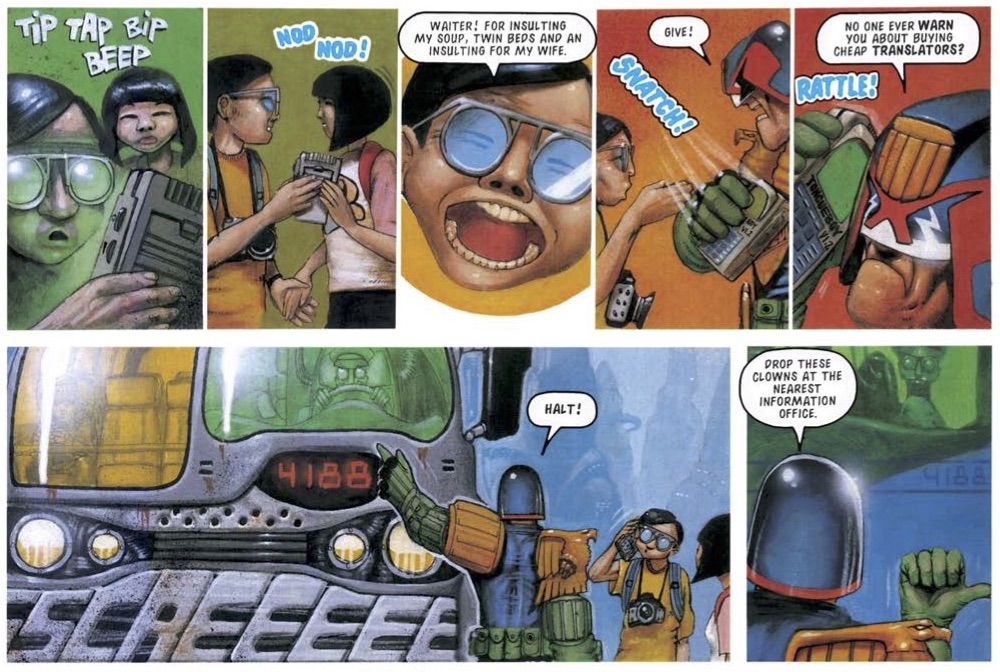
1:46:42-end: We wrap things up by looking ahead to the next episode, in which we’ll reach “The Pit,” an attempt to change the status quo around Dredd in an unexpected way, and also do our usual wrap up mentions of the usual suspect sites: Tumblr, Instagram, Twitter, and Patreon. As always, thanks for listening and reading along. Be back in a month for Dredd in a position he never asked for…


And here’s the direct link for people who want it: https://theworkingdraft.com/media/Drokk/DrokkEp26.mp3
First, I loved the staring contest. It was great. Definitely my favourite story in this volume.
Also, I can’t get passed the colouring on Ezquerra’s art here. I think it looks terrible.
You mentioned how Dredd works better when he’s “just doing his job” and not the centre of a massive event and it reminded me of one of the things that many people complimented the 2012 Dredd movie about, which is that to Dredd the events of the movie are just a “drug bust” and that he deals with stuff like that every day.
Finally, one thing you didn’t mention but that I thought was interesting, was that I noticed Wagner bringing back the subplot about democracy in Mega City One. Considering that Ennis had seemingly ended that plot, it’s interesting to see it brought back in several different strips. Statue of Judgement has the “democracy now” protesters and The Decision is explicitly about making MC1 more democratic. It’s been about four years since the referendum story, so I guess Wagner figures enough time had passed.
I’m also pretty sure this volume contained the first Dredd I ever read, though the one issue of either 2000ad or the Megazine someone gave me left so little impact that I can’t remember any of the stories I read. (I do recall that it advertised Judge Dredd “spugs” or “pogs”, which was apparently more interesting to 11-year-old me.)
A always, a delight hearing you two talking, especially about a character that I grew up alongside.
Wagner has used presidents in the past, simply not in Dredd: most famously (and possibly Carlos Ezquerra’s greatest contribution to popular culture) with a shower threesome between Ronald Reagan, Johnny Alpha and Durham Red: https://twitter.com/2000AD/status/624521191613722624
IIRC in the UK in the mid 90’s there was a certain disappointment in Clinton as president because he seemed politically little different from Reagan or Bush sr. And I get the idea that Wagner was far less forgiving of Clinton over the Paula Jones and Gennifer Flowers allegations from ’91.
There’s a strong case to say that any comments on Bush Sr by Wagner were depicted by the Chief Judge hierarchy of the previous few years: after all, they had just removed the previous Chief Judge who happened to have once been the head of the Judge Secret Service, an interesting parallel with the previous president being the onetime head of the CIA.
If you both liked the Staring Contest then you may like this too: https://www.youtube.com/watch?v=SWgg20IqibM This was adapted from a self published UK comic from the mid 90’s- I wonder which strip came first?
Finally, I’d be tempted to suggest you interrupt your regular Case File reading and after the Cal Files in volume 24 simply read the Dredd Pit collection which prints all thirty issues of the story in one go. The Case Files interrupt the story with other stories from the same period that appeared in both 2000ad and the Magazine, as well as volume 24 containing only the first 14 episodes, with the concluding 16 episodes appearing in volume 25. I think the story would suffer from the interruptions, as its a highlight from this period.
Good chat, chaps. Like Matthew, I thought the democracy stuff was noteworthy, though maybe that was just in contrast to “Goodnight Kiss”, which was indeed “Unforgiven” without the subtlety or characterisation.
Although Reagan wasn’t lampooned in Dredd, Alan Grant did have him as the mcguffin in a Strontium Dog story in the mid-80s. I suspect Clinton was selected JUST because he was President, not for more political reasons.
Finally, the revival of the Angel Gang was, for all the cleverness of that last couple of panels, a terrrible idea, presumably done purely because the film was about to feature them. I think Wagner said later that he regretted it.
Another great episode! I was touched by your shout out to listeners & patrons at the end of the podcast. I have only been listening for about six months, but I have been devouring the back catalog & I deeply appreciate the work you’ve done. I discovered the channel through Drokk!, as I binged the Case Files during 2020 lockdown. Every new Drokk! is a banner occasion for me, and I will sit down with the podcast & flip through my physical copies as I listen.
This is an exciting volume, not specifically bc of the content therein (which is mostly strong, as you two point out!), but because we’re on the cusp of some very interesting material. The Pit is one of my favorite Dredd mega-epics, alongside Apocalypse War & Necropolis. I can almost taste how crunchy the serial will get in the near future! I can’t wait to hear how Jeff responds to such a significant aesthetic & thematic statement as the Pit. I don’t like where Galen as a character & idea ends up when she exits the strip, but I love what she signifies & offers for the strip. She never reaches her narrative potential, as is the case with many Dredd supporting characters.
I’m so glad Graeme called out the visual reference to the Spectre in Goodbye Kiss. I was going mad that no one mentioned it before hand. So strange & I can’t see the reason for it… Goodbye Kiss is, as Jeff says, one of the stronger Ennis scripts for 2000 ad, but then again, I think Ennis is a repugnant writer. So the bar is low. You two make a fantastic point about how contemporary racism is often blindsided by audiences, while it is only called out once it safely transitions to ‘the past,’ ie when we are no longer culpable and can call people from years back racist. Look at how disgusting Preacher often is! I remember one prestige issue ending with Cassidy riding into the sunset asking his horse whether he should try to have a threesome with his girlfriend & her best friend… Not a good look!
I’m surprised neither of you mentioned Ennis’ boneheaded swipe of the Conan crucifixion from the Millius movie. I can be charitable & say perhaps Ennis was being clever, since Stallone was playing Dredd in the movie, & Stallone was seen as the most obvious peer to Schwarzenegger. But I think that’s giving too much credit to Ennis. For me it boils down to how Ennis’ default is to stage Dredd as ‘ultimate badass.’
Jeff makes a couple comments about Castillo that I am curious whether he’ll amend some case files down the line.
I’d love to see a bonus Drokk! episode where you cover the first Judge Dredd movie. It has many failings, but I also think it would be worthwhile to cover. The PR fallout from the movie, at the very least, provides some context for 2000 ad’s decisions about Dredd going forward. Coverage of the Wagner written Chopper serials would also be germane,& wow, I would love to see you two return to Wagner’s America stories. Your coverage of the first installment coincided with lots of very disturbing & game-changing real world events. I can relate to how hard of a time Jeff had reading it in a moment where police injustice & brutality was so much in our faces (it still is). I am curious to see whether Jeff would see America in a different light with some distance. America’s not a perfect work, I love that you guys mention that Wagner is actually often more politically conservative than not, but I would love to hear you two return to America.
Thank you for being awesome!
Thanks for providing so many hours of meaningful discussion!
A couple of scattered thoughts on Bill Clinton:-
– Jeff Lester commented on Bill Clinton as celebrity, but I think one can go a bit further — Bill Clinton was in general one of the major pop culture figures of the ‘90s. Think of all those films — The American President, Dave, Air Force One, Independence Day — that were about creating imagined versions of Bill Clinton that revised what made conventional opinion uncomfortable with him: the womanizing, the avoidance of military service. It’s not too surprising that Wagner went there, especially when one considers how drab and unappealing the British political scene, the painful slow dragged-out death of Major’s government, would have seemed as a source for writing anything at all.
– One thing that Jeff Lester did not mention that’s obviously relevant, I think, is that 1995 came after 1994. And what had happened in 1994? These stories that present an essentially hapless, incapable, and henpecked Bill Clinton were not written at a time when his political fortunes were at their lowest ebb, just after the Republican takeover of Congress. Which, it is worth remembering, was an *earthquake* at the time, and had loads of people writing the Clinton presidency off entirely.
– That being said, if Wagner’s Clinton seems a little off, that may be part of a more general British difficulty with getting to grips with Clinton. There was a Spitting Image bit, from the unfunny later period of the programme when it, like Major’s government, was dragging itself to a unmercifully delayed grave, that turned on the idea that Clinton was a sort of empty-headed good-looking himbo. It’s a vivid memory, because I saw it on a visit home shortly after I had moved to the US, and it was one of those moments when I had this crushing sense of how off-target the satire seemed from an American perspective.
But it’s not unlike Wagner’s Clinton here. Wagner’s Clinton is basically one of Wagner’s Southern classist stereotypes like the Alabamy Blimps, which are akin to his racist stereotypes in that they turn on having a “funny” accent. You can easily imagine Box Clinton in the Three Amigos as a different character with nothing to do with Bill Clinton, but everything essentially the same — it’s an American pop-culture stereotype in which anyone with that accent is stupid which has been absorbed and regurgitated from a British perspective which only knows it from American media representations like The Dukes of Hazzard.
I’d be curious to know what the story is on Goodnight Kiss, because it’s so very obvious that Ennis means it as the finale to his run (look at how hallucinating Dredd sees a blend of the characters that Ennis read about growing up and his own creations) — and he’d evidently had it planned much earlier. So why is it here now?
Anyway, though, like a lot of Ennis’s run, it’s not all that good, but it’s interesting to pick apart. One thing that’s obvious is that this prefigures Preacher, the Ennis who’s fascinated by the intersection of Westerns and Protestantism — and it suggests to me that in fact, Preacher might really be largely about the traces of Ulster Protestant (“Scotch-Irish”) culture in a certain idea of America.
If Pat Mills saw — or at least reads his own work in hindsight as seeing — Dredd as a priest in the Christian Brothers, Ennis *literally* turns Dredd into a dissenting Protestant minister in what is probably the single most interesting issue of Dredd that he’s ever written. And again, when Dredd turns the Marshals (very unsubtle mirrors of the judges) into missionaries “spreading the word.”
And one of the things that’s most revealing, maybe, is that Dredd is the “justice of blood vengeance.”
To switch to Wagner for a moment, our hosts commented on the fun ending of Three Amigos, with Dredd letting the Angel Gang go on the wrong side of Mega-City One. That’s a variant on one of Dredd’s oldest jokes, where he can’t be Dredd until he’s sworn in, because he *has* to follow the rules to the point of absurdity. Here, it’s the same joke. Dredd can’t re-arrest the Angels until they break the deal by trying to re-enter the city. Which they have to do — there is no point to Dredd doing this, except to follow the rules for their own sake.
What this is *not* is the “justice of blood vengeance.” The thing about Ennis’s Dredd is that he’s worse than Wagner’s Dredd — and Ennis likes him more than Wagner does. In context, what is Dredd taking vengeance for? Hoolihan, presumably. And of course, the Marshals are also taking vengeance as their motivation.
So we have two tribes, one the “bad” twisted mirror-image of the other, motivated by tit-for-tat vengeance, but the “good” tribe wins by being so tough and brutal that it converts the other tribe into helpless subordinates who exist only to spread the word about how unstoppable the “good” tribe is? That, for Garth Ennis, is the Law.
Gosh, that doesn’t seem to connect with Northern Ireland at *all.*
Final scattered thought:-
– Pat Mills’s story is curiously oblivious to the fact that there were Dredd stories after he last wrote one. I suppose that in a way that’s a sign that Pat Mills is the only person who can write the character outside of Wagner’s shadow, who has a vision for the strip that’s genuinely independent of any element of reacting to Wagner.
But my God, is it weird to read a Dredd story that takes as its unquestionable basis that Dredd is supposed to be this all-around good guy that he hasn’t been at this point for long enough that there are probably readers who weren’t *born* when Dredd was that.. Obviously, Mills the highly practical comics professional has articulated his theory on this: that readers don’t like to see their heroes as other than heroes. And obviously, that’s in tension with the fact that Mills the non-practical person who says what he thinks hates the idea of the traditional hero. As he has Rico articulate here, and if this was, you know, Marshall Law, this would all work.
But the idea that *Dredd* is this squeaky-clean icon of decency? By this point, people who want to represent Dredd admiringly make him absurdly macho. But not a good person!
I’d not previously read CF 23, 1 / because this is well a truly in the depth of the problem years for 2000AD, and 2/ because I’d seen The Three Amigos from afar and thought it looked ridiculous. How wrong I was. Not sure how Wagner and Hairsine managed tp pull it off but boy oh boy, what a fabulous story.
One or two duds in the collection but well worth a Drokk rating.